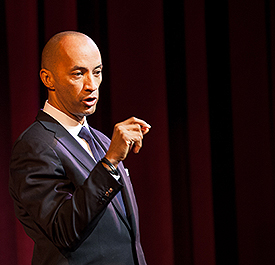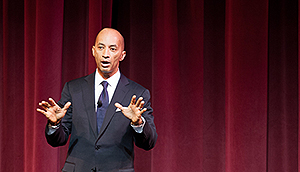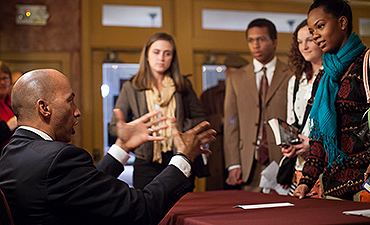Pitts offers advice from his life, career to students, educators
Claire Ronner | Nov. 13, 2012

At 12, Byron Pitts could neither read nor write, and spoke with a stutter. He somehow made it to college, where he continued to struggle until he met friends and teachers who helped him develop study habits and a broad vocabulary.
Today, Pitts is a CBS Evening News correspondent and contributor to 60 Minutes, successful in a field dependent upon the ability to conduct research and interviews and, of course, to communicate effectively.
“Your dream should be so big that people laugh at you when you tell them what it is,” Pitts told the students in his audience at the Buskirk-Chumley Theater Monday night. “At 18, I knew I wanted to be on 60 Minutes, and they laughed at the kid with the stutter. But look where I am now.”
Now, Pitts is an award-winning journalist at CBS who has covered international events in Afghanistan and domestic topics such as programs for at-risk youth. His talk was the last of the school’s Speaker Series events this fall. He blended his career advice and thoughts about the future of journalism with his own story, some of it recounted in Step Out on Nothing, his memoir.
Pitts grew up in east Baltimore, the second of three children of parents who later divorced. Until he was 12, Pitts was unable to read. When doctors tested Pitts in middle school to address his illiteracy, they diagnosed him as mentally retarded and suggested he be institutionalized. His mother was working as a seamstress at the London Fog coat factory at the time with little means to seek expensive treatment.
The doctors, acknowledging her situation but standing by their diagnosis, said little assistance was available for Pitts until he turned 18. But instead of simply accepting the doctors’ word as the end-all, Pitts said his mother replied, “if we wait until he’s 18, my boy will be dead or in prison. He needs help now.”
And Pitts learned to read, though it wasn’t until college that he overcame his persistent stutter.
Pitts credits his mother, grandmother, community and caring professors with “stepping out on nothing” to help him achieve academic success. He told of having flunked English and being on track to fail a second time when a professor suggested he give up on college.

Crying, he filled out the application to withdraw from Ohio Wesleyan University. A stranger approached him, asked what was wrong, and turned out to be a first-term English professor who ended up mentoring him throughout his college career.
“Educators, you have a gift to be able to influence young people and give them comfort,” Pitts said. “And students, you have the opportunity and responsibility to share and step out on nothing for someone. All of us have the opportunity to help someone else. We receive so much in return by giving away our gifts and talents.”
Calling students to strive for excellence and work toward their goals by battling indifference, Pitts quoted former NFL cornerback Deion Sanders and said, “if your dream only includes you, your dream isn’t big enough.”
“Your dream goes beyond your own ambition for yourself,” he said. “It goes beyond you, the university and Bloomington—it’s also your dream to the world.”
When asked if his childhood enforced his career choice to go into broadcast journalism and whether it influences the stories he chooses, Pitts admitted that it does.
“I like doing stories about the human condition, about struggle,” Pitts said. “I know what it means to struggle, what it means to be voiceless, for someone to say you don’t matter. I like doing stories about the underdogs. I believe it’s my job as a journalist to give a voice to the voiceless, to afflict the comforted and comfort the afflicted.

“Sadly, in many ways I make my living covering death, but I’m ultimately okay with that,” Pitts added. “What troubles me most is indifference from citizens. When good and decent people have their individual talents and don’t use them change their communities, indifference can be a deadly weapon.”
The role of journalists, Pitts described, is to keep people accountable, give communities a sense of what’s going on in the world around them, and provide information and truth to people, without a political bent.
He recalled a moment in the aftermath of Sept. 11 when People magazine published a cover with the photo of an anxious businessman awaiting word from his wife, who worked in the World Trade Center. The man had his television turned to CBS News, and Pitts happened to be on air when they took the photograph.
“In that moment, that man could care less about my political leanings,” Pitts related. “What he wanted, and what he deserved, was information, truth, accuracy and real context for the situation.”
Despite plummeting approval ratings for Congress, Pitts said he believes the American people have always proven to make the right decision, especially when provided with accurate information.
“As long as there is a United States of America, there will be a place for journalists,” Pitts said. “As long as children love to hear stories whispered in their ears, there will be a place for storytellers. We live in an amazing country with our freedom of the press. You can wake up in the morning, pick up information from journalists in this country and know that more than likely, that’s the truth. It’s not influenced by the government. And that in itself is something to be grateful for.”
Earlier in the day, Pitts visited the school and was the guest of honor at a reception sponsored by the Bloomington Press Club.
The School of Journalism Speaker Series brings top journalists to campus each semester for a series of lectures that are free and open to the public. Previous guests this fall included authorAndrew Ferguson and The Washington Post’s Rajiv Chandrasekaran, who was the school’s first Faculty Lectureship guest.

